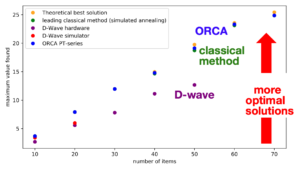
PRESS RELEASE — ORCA Computing demonstrated the use of photonic based quantum computers to certain real-world problems — a significant advance towards solving commercially valuable problems on near-term quantum computers, the company reports in a paper on the pre-print server ArXiv.
In the study, researchers used the device to tackle a QUBO problem, which is shorthand for a combinatorial optimization problem that have a wide range of applications, including finance, economics and machine learning. It is in the class of NP-hard problems and therefore challenging to solve on classical computers.
Alongside these results, ORCA (TQI: ORCA) has also released benchmarking results which demonstrate better QUBO performance on the current best quantum method, developed by D-Wave and a competitive classical method, known as simulated annealing.
The ORCA development spurs photonic-based platforms in the race to deliver first demonstrations of ‘quantum value’. This is the point where a quantum computer solves a commercially useful problem.


Richard Murray, CEO and co-founder of ORCA Computing, said: “Finding commercially relevant use-cases for shallow, near-term quantum computers is an elusive, challenging goal for the community: today ORCA finds a bridge between photonic hardware, and widely applicable QUBO optimizations. “
“Photonic quantum computers using single particles of light are seen by some as the poorer third cousins to superconducting circuits or trapped ions. However, ORCA’s ground-breaking work on building simpler and room-temperature photonic quantum computers from off the shelf telecoms components is slowly changing that out-of-date perception. In this paper, we go one step further and show that photonic systems can be applied to solve general classes of problems- such as the QUBO optimization problem. This paves the way for photonics to be used for real and exciting applications that can be achieved sooner than large error corrected systems.”
The ORCA paper highlights:
- Allowing QUBO problems to be solved on near-term photonic ‘boson sampling’ systems by demonstrating a mapping between output states of these systems and the set of all QUBO-compatible binary sequences.
- Showing that near-term, shallow and non-universal quantum systems can resolve QUBO problems without requiring a large number of operations, easing the path to near-term quantum advantage on a real-life photonics system.
Richard Murray said: “ORCA has also simulated this novel approach and compared it to existing QUBO solvers in use. We have found that ours out-performs a competitive classical method, as well as the D-wave quantum methods when applied to the knapsack problem: a packing optimization algorithm.”
The method developed by ORCA is well-suited to its PT-series photonic quantum computing system. This uses a proprietary technology, along with optical fibre to solve quantum computing problems in a rack-mounted, portable and room temperature system.
ORCA is working with leading users of quantum computers to apply this system to real-world problems across ICT, Energy, Finance and Defense.
ORCA have released the notes and simulation code as an open-source resource for interested academics, companies and individuals on their public Github account: https://github.com/orcacomputing/quantumqubo
For more market insights, check out our latest quantum computing news here.
















